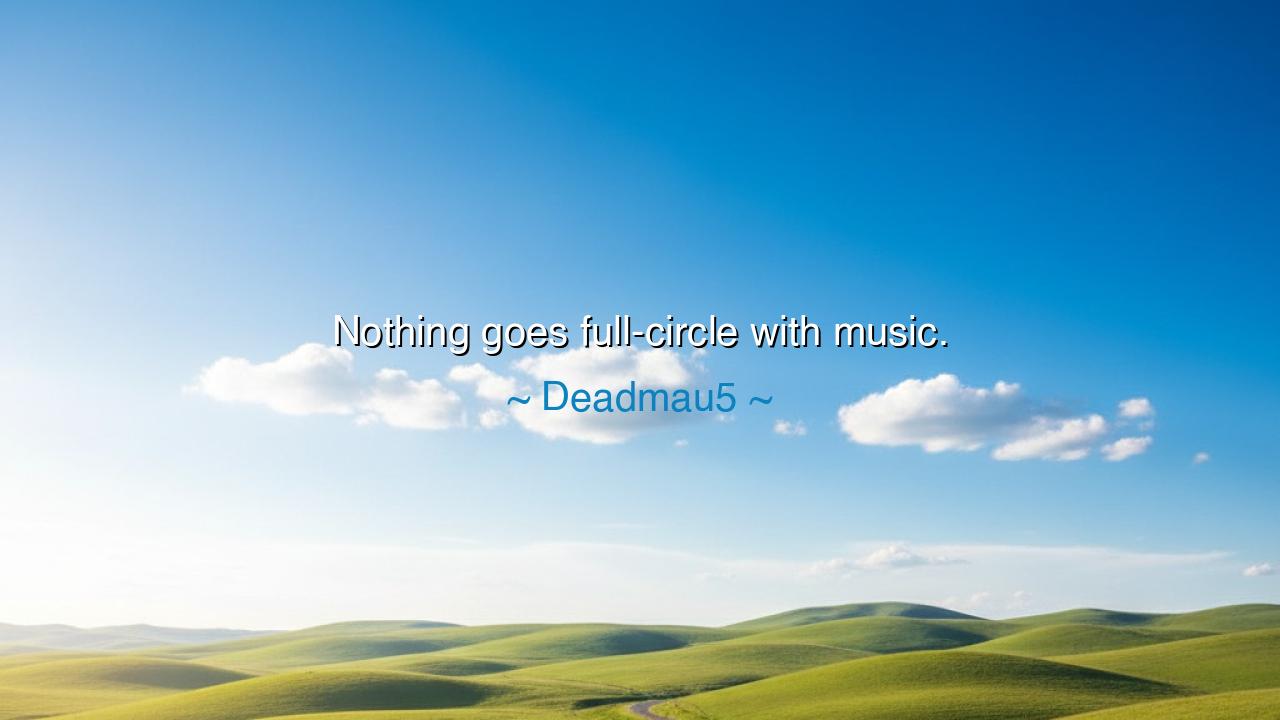
Nothing goes full-circle with music.






Deadmau5, the architect of electronic soundscapes, once declared with striking honesty: “Nothing goes full-circle with music.” Though at first his words may seem a lament or a confession of disillusion, within them lies a profound vision of art’s restless spirit. For music, like the flowing river, does not return to its source in perfect repetition. It evolves, shifts, and mutates. What begins in one age is reborn in another, not as a mirror, but as a transformed echo. Thus, to say that music never goes full-circle is to say that creation is infinite motion, ever-changing, never content to simply repeat the past.
When Deadmau5 speaks of this truth, he speaks as one immersed in the pulse of modern sound, where trends rise and vanish like stars at dawn. One genre may dominate, another may fade, yet when it returns it is never the same—it carries with it the imprint of time, of new instruments, of new souls who have heard and reshaped it. Music is not a wheel that circles endlessly; it is a spiral, ascending or descending, always altered, always renewed.
This is no modern revelation. Even in the days of the ancients, Plato wrote that changing the music of a people would change the very laws of the city. He knew what Deadmau5 reminds us: that music is not static, but alive, tied to the breath of its generation. The chants of the temple evolved into hymns, hymns gave birth to symphonies, symphonies transformed into jazz, jazz bent itself into rock, and rock into electronic waves. Each carries echoes of the past, yet none completes the circle. They are branches of the same tree, ever growing outward, never curling back upon themselves in perfect symmetry.
History gives us the tale of Johann Sebastian Bach. In his own day, his intricate fugues and sacred works began to wane in popularity, replaced by the lighter styles of the Classical era. Yet centuries later, when his music was revived, it did not return untouched. It was heard through the ears of a new age—romantics, modernists, and even jazz musicians reinterpreted him, reshaped him, breathed him anew. Bach did not come “full-circle”; he became something greater, a root that nourished new forests of sound.
The meaning, then, is clear: music is eternal, but never repetitive. It teaches us that life, too, does not return perfectly to what it once was. Every trial, every joy, every generation reshapes the melody of existence. We cannot go back to the beginning unchanged; time has altered us. What returns to us—whether a memory, a tradition, or a style—is never the same, for we are never the same. The circle is broken, but the path is infinite.
From this, we draw a lesson: do not cling to the dream that things will return exactly as they were. Instead, embrace transformation. If music never goes full-circle, neither does life. Let the past inspire you, but do not seek to imprison it. Take its themes, its echoes, and weave them into something new. In this way, you walk in harmony with the eternal law of creation: change.
Practically, this means: listen to the past, but create for the present. Do not fear innovation, for it is the lifeblood of art. Welcome change in your own life as musicians welcome new instruments, new rhythms, new forms. Do not demand that joy or beauty return exactly as before—let it return differently, transformed, deeper. Carry your experiences like melodies, knowing they will resurface not as circles, but as spirals guiding you forward.
So let Deadmau5’s wisdom resound: “Nothing goes full-circle with music.” And let us see in it not despair, but wonder. For if art never returns unchanged, then creation is endless, and life itself is a song that will never tire of finding new notes. To live is to compose without repetition, to grow without circling back, to carry the past into a future that forever transforms it. Thus we, like music, are eternal motion—unfinished, unbounded, unrepeatable.






AAdministratorAdministrator
Welcome, honored guests. Please leave a comment, we will respond soon